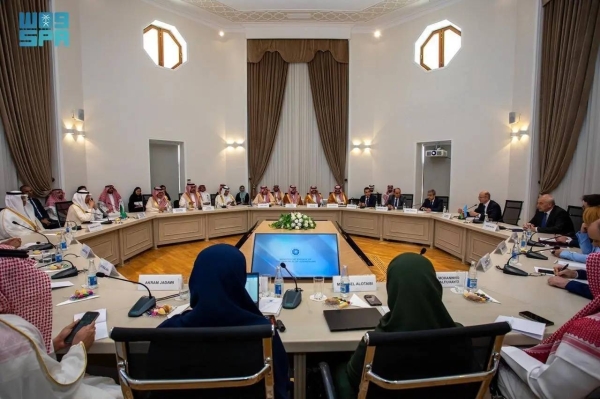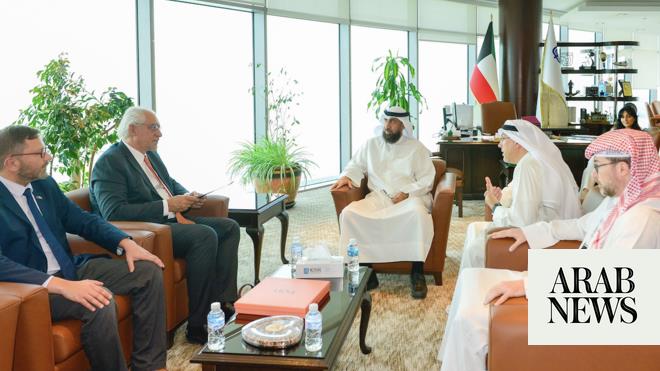
Senior European Union (EU) and Gulf Cooperation Council (GCC officials have held talks in Brussels focused on deepening relationships between the blocs in a number of fields, including climate change, energy and security.
EU and GCC ministers reviewed the fruitful progress in the strategic partnership between the GCC and EU and noted the minutes of the meeting of the EU-GCC Regional Directors in July 2021 and the minutes of the meeting of the Joint Cooperation Committee held in the General Secretariat on Feb. 3, 2022.
They stressed the importance of continuing to strengthen relations between both sides in light of regional challenges, in order to be a strong and effective basis for regional and international security and stability.
A post-summit joint statement said ministers had stressed the importance of joint action on climate change, protecting the environment and developing renewable energies. They also congratulated the UAE for its planned hosting of the UN climate conference Cop28 next yea
Saudi Foreign Minister Prince Faisal Bin Farhan, chairman of the current session of the ministerial council of the GCC, co-chaired the talks with EU"s foreign affairs chief Josep Borrell, vice-president of the European Commission. The meeting was attended by EU and GCC foreign ministers, in addition to GCC Secretary-General Dr. Nayef Falah Mubarak Al-Hajraf.
“We have a strong relationship, especially on the economic side, but it’s important we continue these high-level consultations,” Prince Faisal said.
“We will, I’m sure, be talking about regional security, international peace. But also the agenda that is most important, which is international cooperation vis-a-vis climate change, energy security, but also just deepening the strong bonds and ties between our two collective blocs.”
The GCC and EU are also seeking to enhance relations on education, health and cybersecurity. Borrell said the EU was looking to appoint a special envoy for the Gulf, in part because of security issues and Iran.
“Not just because of energy, but because in this region the transition towards a green economy will be one of the most important aspects for us, for them, for the humankind,” he said.
The ministers agreed on the importance of enhancing relations between the GCC and the EU in a wide range of areas. To this effect, they endorsed a Joint Cooperation program for the period 2022-2027. They affirmed that this partnership contributes to deepening mutual trust, achieving common interests and maintaining regional and international security.
The ministers stressed the importance of promoting joint action in combating climate change, protecting the environment and developing renewable energies. They commended the commitments expressed by the GCC countries in this regard, and welcomed their active participation in the UN Climate Change Conference COP26, and the announcements regarding net-zero ambitions and implementing the Circular Carbon Economy approach updating the nationally-determined contributions.
The ministers stressed the importance of developing long-term strategies to guide the full implementation of the pledges. They affirmed that the inclusive implementation of the commitments and principles of the UNFCCC and the Paris Agreement, including COP26 outcomes, is the basis for progress in meeting the Sustainable Development Goals of the 2030 Agenda, in sustainable investment in all climate solutions, development partnerships and energy cooperation.
The ministers commended the leadership of Saudi Arabia for launching the Middle East Green Initiative as well as the commitment of the GCC states to cooperate in its implementation.
They congratulated the United Arab Emirates on hosting the COP28 Conference, Bahrain on aiming to reach net-zero emissions by 2060, and Qatar on hosting the International Horticultural EXPO 2023, as these are important signals to the international community that reflect the region"s determination to take measures to protect the environment for future generations.
The ministers exchanged views on issues of common interest, including the Middle East Peace Process, Yemen, Iran, Libya, Syria, Lebanon, Iraq and Afghanistan. They stressed the strategic importance of close coordination between the GCC and the EU in this regard.
The ministers stressed the urgent need to improve the humanitarian situation in Yemen, agree on a ceasefire without preconditions, and reach a political resolution to the conflict through negotiations facilitated by the UN, based on the GCC Initiative and its implementation mechanism, the outcomes of Yemen’s National Dialogue Conference, and UN Security Council Resolution 2216.
They underscored the importance of Saudi Arabia’s initiative for a ceasefire and political solution in Yemen. The ministers expressed their condemnation in the strongest terms of the terrorist attacks launched by the Houthi militia using missiles and drones against the UAE and the KSA, and expressed support for peaceful solutions for Yemen. They reaffirmed that terrorism in all its forms and manifestations constitutes one of the most serious threats to international peace and security.
The ministers reiterated their concern at the lack of progress towards resolving the dispute between the UAE and Iran over the three islands Abu Musa, Lesser Tunb and Greater Tunb. They reiterated their support for a peaceful settlement of this dispute in accordance with international law, either through direct negotiations between the parties or by referring the matter to the International Court of Justice.
The ministers condemned the proliferation of ballistic missiles and drone systems used in hundreds of attacks against civilians, civilian infrastructure and the Global Coalition Against Daesh (so-called IS).
The ministers addressed the JCPOA talks in Vienna and stressed that a full and effective implementation of the JCPOA can contribute to comprehensive and lasting efforts to ensure that the Gulf region remains permanently free of nuclear weapons and help address other regional issues.
The ministers agreed on the importance of continued common international efforts to enhance stability and prosperity in Iraq, prevent the spread of violent extremism in the country, including Daesh, and improve prospects for economic recovery, and energy independence.
The ministers denounced the attempt to assassinate Prime Minister Mustafa Al-Kadhemi, praised Iraq"s ability to complete the parliamentary elections and underlined the need to form a government, which reflects the results of the election in order to maintain political stability.
The ministers expressed their concern regarding the humanitarian and economic crisis in Afghanistan, and agreed on the importance to urgently respond to the needs of the Afghan people, including refugees and displaced persons.
They stressed the importance of the Taliban fulfilling their human rights obligations, especially towards women and girls, counterterrorism commitments, including not allowing any terrorist organization to train, organize or raise funds in Afghanistan, as well as the importance of preventing foreign fighters from entering the country.
Ministers also highlighted the need for inclusive governance in Afghanistan. Ministers called on the Taliban to ensure unimpeded access to aid and urged the international community to find ways to provide all other types of funding necessary to provide basic services directly to the population.
On Syria, the ministers expressed their deep concern over the deteriorating humanitarian situation. They agreed on the need to provide basic life-saving assistance in all areas of Syria, as part of the implementation of the UN Humanitarian Response Plan. The Ministers reiterated their support for the full implementation of Security Council Resolution 2254, including the political process led by the UN Special Envoy.
Regarding Lebanon, the ministers viewed positively the resumption of regular meetings of the Council of Ministers of Lebanon and urged expeditious and effective decisions by the Lebanese Government to initiate direly needed reforms that would enable a quick conclusion of the agreement with the International Monetary Fund (IMF).
The ministers also underlined the importance of holding free, fair, transparent and inclusive elections as scheduled on May 15, 2022, and called on the Lebanese authorities to promptly make available all the necessary resources and intensify technical and administrative preparations to ensure the adherence to the agreed timelines and ensure the integrity of the electoral process. They also underlined the need for confidence building measures, and the need to work together to help maintain Lebanon’s stability and respect for its unity and sovereignty in line with UNSC resolutions 1559, 1680 and 1701.
On the Middle East Peace Process, the ministers called for de-escalation in Al-Quds and reiterated their commitment to a two-state solution that meets the legitimate aspirations of the Palestinian people, based on 1967 lines and UNSC resolutions 242, 338, 2334 and other relevant UN resolutions, Al-Quds as the shared capital of both states, and a just and fair settlement for refugees. They reiterated the importance of sustained financial support for UNRWA.
On Libya, the ministers re-affirmed their support for the UN efforts to hold free, fair, inclusive and credible presidential and parliamentary elections. They renewed their call upon all political parties in Libya to refrain from actions that undermine the political process and to adhere to the results of the elections, and stressed the importance of the withdrawal of all foreign fighters, foreign forces and mercenaries from Libya without delay.
The ministers welcomed the success of the 6th EU-Africa summit, held in Brussels on Feb. 17-18, 2022, and underlined the importance of GCC-EU co-operation on African issues. The GCC and EU ministers agreed to hold their next meeting in 2023 in the GCC region. — Agencies












